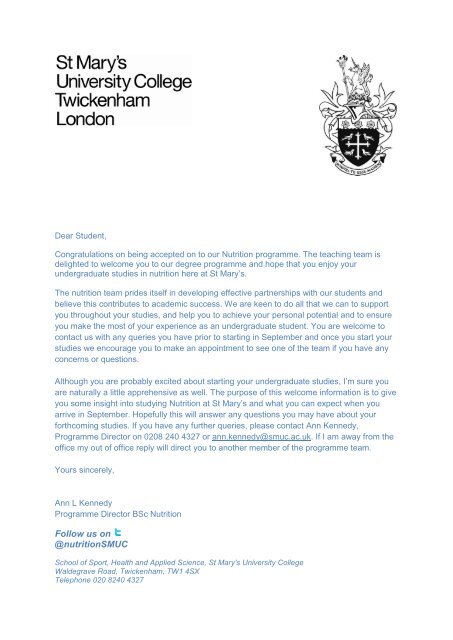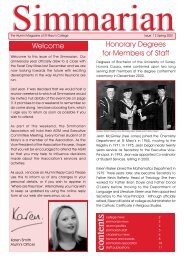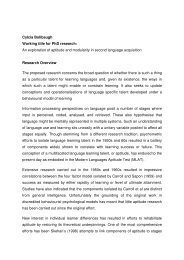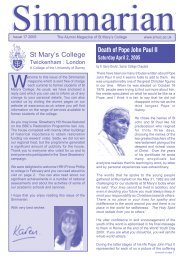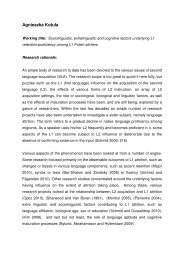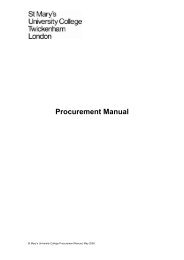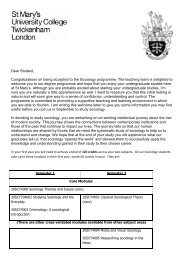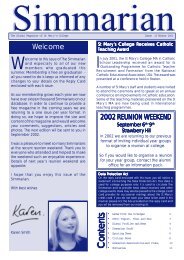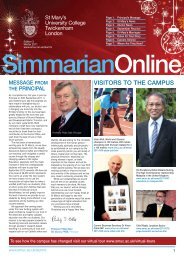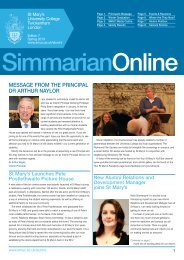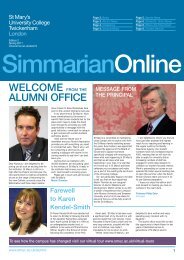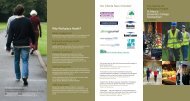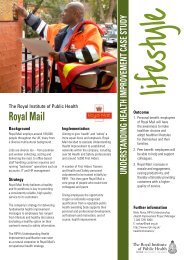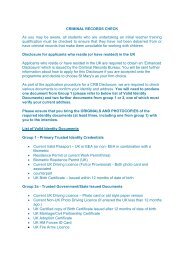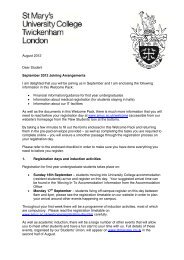letter - St Mary's University College
letter - St Mary's University College
letter - St Mary's University College
You also want an ePaper? Increase the reach of your titles
YUMPU automatically turns print PDFs into web optimized ePapers that Google loves.
Dear <strong>St</strong>udent,<br />
Congratulations on being accepted on to our Nutrition programme. The teaching team is<br />
delighted to welcome you to our degree programme and hope that you enjoy your<br />
undergraduate studies in nutrition here at <strong>St</strong> Mary’s.<br />
The nutrition team prides itself in developing effective partnerships with our students and<br />
believe this contributes to academic success. We are keen to do all that we can to support<br />
you throughout your studies, and help you to achieve your personal potential and to ensure<br />
you make the most of your experience as an undergraduate student. You are welcome to<br />
contact us with any queries you have prior to starting in September and once you start your<br />
studies we encourage you to make an appointment to see one of the team if you have any<br />
concerns or questions.<br />
Although you are probably excited about starting your undergraduate studies, I’m sure you<br />
are naturally a little apprehensive as well. The purpose of this welcome information is to give<br />
you some insight into studying Nutrition at <strong>St</strong> Mary’s and what you can expect when you<br />
arrive in September. Hopefully this will answer any questions you may have about your<br />
forthcoming studies. If you have any further queries, please contact Ann Kennedy,<br />
Programme Director on 0208 240 4327 or ann.kennedy@smuc.ac.uk. If I am away from the<br />
office my out of office reply will direct you to another member of the programme team.<br />
Yours sincerely,<br />
Ann L Kennedy<br />
Programme Director BSc Nutrition<br />
Follow us on<br />
@nutritionSMUC<br />
School of Sport, Health and Applied Science, <strong>St</strong> <strong>Mary's</strong> <strong>University</strong> <strong>College</strong><br />
Waldegrave Road, Twickenham, TW1 4SX<br />
Telephone 020 8240 4327
BSc Single/Joint Honours Degree Programme<br />
in Nutrition<br />
Welcome Pack 2013-2014<br />
For September 2013 Entry<br />
School of Sport, Health and Applied Science<br />
<strong>St</strong> Mary’s <strong>University</strong> <strong>College</strong><br />
Waldegrave Road, <strong>St</strong>rawberry Hill, Twickenham TW1 4SX<br />
Switchboard 020 8240 4000 Fax 020 8240 4255<br />
www.smuc.ac.uk
CONTENT LIST<br />
Page<br />
SECTION 1 School of Sport, Health and Applied Science 3<br />
SECTION 2 Overview of the Programme 4<br />
SECTION 3 Assessment/Attendance/Equipment Guidelines 7<br />
SECTION 4<br />
Programme <strong>St</strong>ructure and Modules<br />
Modules and Recommended Reading<br />
9<br />
10<br />
NU <strong>St</strong>udent Welcome Pack 2013 3 01/08/2013
SECTION 1<br />
THE SCHOOL OF SPORT, HEALTH AND APPLIED SCIENCE<br />
There are four academic Schools within the <strong>College</strong> and the School of Sport, Health and<br />
Applied Science (SHAS) is the focus for the <strong>University</strong> <strong>College</strong>'s scientific provision<br />
including the nutrition degree.<br />
The School offers programmes in the following areas sports science, sport rehabilitation,<br />
coaching science, strength & conditioning science, health & exercise science and<br />
nutritional science.<br />
Furthermore, the school’s Professional Short Courses Unit offers a range of vocational<br />
courses available to our students and for members of the local community wishing to<br />
develop careers in the area of sport, health and fitness.<br />
The School is committed to offering students vocationally-relevant programmes of study<br />
with the highest academic standards. It has undergone rapid expansion in recent years,<br />
with the building of new facilities to support the programmes, and the employment of<br />
expert staff in the various fields.<br />
All of the School’s teaching and learning activity is underpinned by significant research<br />
and consultancy (knowledge transfer) work, and staff are actively involved in professional<br />
associations such as the Association for Nutrition.<br />
NU <strong>St</strong>udent Welcome Pack 2013 4 01/08/2013
SECTION 2<br />
OVERVIEW OF THE PROGRAMME STRUCTURE<br />
What is an undergraduate degree?<br />
As you will have gathered from the prospectus, an undergraduate degree is normally<br />
studied full time over 3 years; however this time will be longer if you are studying part<br />
time. The first year of your degree does not count towards your final degree<br />
classification, although you need to pass all the modules you take to obtain your<br />
degree. The first year is used to provide the foundation for your further study and to<br />
help you to produce degree standard work. Experience shows that those students<br />
who perform best in this year generally go on to attain higher degree classifications<br />
than students who perform less well. From the second year onwards your academic<br />
achievement, i.e. the marks that you achieve, contribute towards the classification of<br />
degree you will be awarded at the end of your studies.<br />
What are Credits/Modules?<br />
At <strong>St</strong> Mary’s <strong>University</strong> <strong>College</strong> our programmes comprise of a series of modules,<br />
usually worth 20 credits. Each year you will need to accumulate 120 credits (pass 6<br />
modules), giving you a total of 360 credits to achieve your degree. Some modules<br />
are worth 40 credits, including your final year dissertation/research module. Each 20<br />
credit module equates to approximately 200 hours of learning, some of this time will<br />
be in classes with staff and other students but additionally you are required to<br />
complete further student-led study, this may include reading, preparation for class<br />
sessions, research etc<br />
What is a degree classification?<br />
When you graduate your degree will be classified you will either attain a first-class<br />
degree classification (average of 70% & over), upper-second class (average between<br />
60-69%), lower-second class (average between 50-59%) or third class degree<br />
(average between 40-49%). This classification is based on your performance at<br />
levels 5 and 6 (your second and third year)<br />
What are joint and single honours degrees?<br />
Here at <strong>St</strong>. Mary’s we offer joint and single honours degrees. Single honours<br />
students in nutrition will take all 360 credits in nutrition related modules. This single<br />
honours pathway is accredited by the Association for Nutrition and entitles graduates<br />
to direct entry to the professional register of nutritionists.<br />
Some students prefer to combine subjects and study a proportion of their modules in<br />
each of two disciplines e.g. you may have decided to combine studies in nutrition with<br />
studies in sports science, health, exercise and physical activity or psychology.<br />
It is possible to transfer from single honours to joint honours and vice versa,<br />
but these transfers MUST occur within the first 2 weeks of your studies so if<br />
NU <strong>St</strong>udent Welcome Pack 2013 5 01/08/2013
you are considering making a change you need to contact the Programme<br />
Director, Ann Kennedy (ann.kennedy@smuc.ac.uk) before you register in<br />
September or speak to Ann when you arrive for induction in September.<br />
How is the academic year organised?<br />
We split our academic year into 2 semesters. Semester 1 runs between September<br />
and December and Semester 2 runs between January and May. Each semester you<br />
will study 60 credits (3 modules). You will be assessed in these modules during and<br />
at the end of each semester. This means there are no final exams based on the<br />
entire three years of your study at the end of the three years, but it also means you<br />
cannot afford to take it easy!<br />
How will I be assessed?<br />
You will be assessed in a number of different ways, and the assessments will depend<br />
on the nature of each module. Example assessments include: essays, worksheets,<br />
presentations, practical sessions and examinations. There will be examination<br />
periods at the end of each semester, but the other forms of assessment are generally<br />
completed during the semester.<br />
What kinds of sessions will I be in?<br />
The teaching time will be split between lectures, seminars, workshops and practicals.<br />
You will find that lectures will tend to be in larger groups, whereas the practicals and<br />
seminars will normally be in groups of between 15-20 students. Smaller group work<br />
such as practicals and seminars provide opportunities for more discussion and for<br />
you to ask questions. However you can also make an appointment to see any staff<br />
at any point, should you need some further help and support.<br />
The following sections will provide you with the most important pieces of information<br />
you will need to know about your first year of study.<br />
NU <strong>St</strong>udent Welcome Pack 2013 6 01/08/2013
First few weeks of study at <strong>St</strong>. Mary’s<br />
What are the important events within the nutrition programme?<br />
Induction week begins on Monday 16 th September 2013. Nutrition students will<br />
have induction meetings during this first week. You will be introduced to<br />
members of the nutrition teaching staff, you will be assigned an academic tutor<br />
and you will have an opportunity to meet other students enrolled on the nutrition<br />
programme. During the induction meetings you will be provided with information<br />
regarding other activities in that week and you will be issued with your timetable<br />
for semester 1. Please make sure that you attend the induction meetings<br />
because important information will be provided!! There will also be an<br />
opportunity that week to discuss your registration status should you be unsure<br />
whether to follow the single honours or combined honours pathway.<br />
When will l be in lecture, seminar and practical sessions?<br />
We will provide you with a more detailed timetable in your induction meetings and<br />
ensure you all know where you should be when teaching begins. Taught<br />
sessions will begin the week beginning 23 rd September. The timings of your<br />
sessions will differ depending on whether you are a single honours nutrition<br />
student or combining with another subject.<br />
Single Honours Nutrition <strong>St</strong>udents:<br />
Single honours nutrition students will study three nutrition modules in semester 1<br />
and three in semester 2. The timetable remains provisional, however your<br />
taught sessions are likely to be held:<br />
In Semester 1: Monday afternoons, Tuesday mornings, and Thursday<br />
afternoons.<br />
In Semester 2: The nutrition modules are scheduled to run on Monday mornings,<br />
Tuesday morning and Tuesday afternoon, and Thursday afternoons.<br />
This timetable information is provisional and room and staff availability can<br />
lead to changes but we hope to avoid this.<br />
Joint Honours Nutrition <strong>St</strong>udents:<br />
<strong>St</strong>udents combining with other subjects will study Nutrition modules on a<br />
Tuesday morning and Thursday afternoon in semester 1 and 2.<br />
This timetable information is provisional and room and staff availability can<br />
lead to changes but we hope to avoid this.<br />
For each module that you study you will provided with a module guide that will<br />
give you specific week-by-week and session-by-session information so you will<br />
know what type of session you will have, at what time and in which room. Each<br />
module also has an intranet site with lots of additional information and learning<br />
resources. We will show you how to access this when you arrive.<br />
NU <strong>St</strong>udent Welcome Pack 2013 7 01/08/2013
SECTION 3<br />
ASSESSMENT/ATTENDANCE/ EQUIPMENT<br />
As study at <strong>University</strong> is very different from school or college we have put<br />
together a few points about the expectations we have of our students,. These<br />
points are made to improve your learning, enhance your performance in<br />
assessments and ultimately to ensure that you graduate with your best possible<br />
degree. We will explore all this with you further once you arrive.<br />
What is expected of undergraduate students?<br />
All undergraduate students are expected to take an interest in the degree they<br />
are studying. More specifically, you are expected to attend ALL timetabled<br />
sessions and try to get the most out of each session. You will be expected to<br />
arrive in good time before each timetabled session so it can run as smoothly as<br />
possible and so you don’t miss any important information.<br />
Lectures, seminars and practicals will not provide you with all the answers or<br />
information, therefore you are expected to read around each session so that you<br />
have a more detailed and thorough understanding of the topic area. You will be<br />
directed towards readings and activities to help you with your learning.<br />
If you are unwell or circumstances mean that you are unable to attend university<br />
or that your academic work is being affected please make sure you contact the<br />
Programme Director, your academic tutor or a member of the nutrition team. The<br />
university email system is the best way to stay in contact with staff. We will also<br />
show you how our email system works when you arrive.<br />
What will be expected of me during taught sessions?<br />
You will be expected to take notes and concentrate on the material being<br />
discussed. Mobile phones should be switched off during sessions (not just on<br />
silent!), You should not access social networking sites etc during lectures unless<br />
and you are asked to do so.<br />
For seminar sessions you are likely to have been asked to do some preparatory<br />
work before the session so you can contribute to the discussion on a particular<br />
topic. In these sessions you will be asked to work in small groups or provide<br />
feedback to the whole group. These sessions are designed to be more interactive<br />
and discussion based, therefore your input is valuable. It is essential that you<br />
complete the preparatory work as directed.<br />
During practical and laboratory based sessions you will be asked to work in small<br />
groups and participate in some form of activity. Whether it is a test on a cycle<br />
ergometer or measuring a plasma cholesterol level, you will be expected to<br />
participate maturely/professionally and relate the practical sessions to the lecture<br />
based information.<br />
NU <strong>St</strong>udent Welcome Pack 2013 8 01/08/2013
What will be expected of me in relation to assessments?<br />
You will be expected to research and work independently on the majority of your<br />
assessments although some may be group based. All coursework must be word<br />
processed and be in accordance with the guidelines you will receive. You will be<br />
expected to hand-in your assessments before the allocated deadline, as any<br />
work handed-in after that point will score 0. You will invariably find that modules<br />
contain seminar support sessions relating to coursework titles, valuable advice is<br />
provided at these sessions. <strong>St</strong>aff will endeavour to mark your assessments within<br />
3 weeks of the deadline, and you will be expected to collect your work and read<br />
the feedback to help you improve for future assessments.<br />
How can staff help me?<br />
The teaching team will be pleased to offer you support and guidance throughout<br />
your studies. We ask that if you wish to see us that you email requesting an<br />
appointment or sign up for an appointment on the diaries we display on our office<br />
doors. We will show you where we are all located when you arrive in September.<br />
If we need to communicate with you we will use your COLLEGE email account,<br />
which will be issued when you arrive. It is vital that you check your college<br />
account regularly. You can arrange to have college emails forwarded to your<br />
other preferred accounts if you wish. <strong>St</strong>udying at university will be very different<br />
from school and college and we expect you to be independent learners and ‘read’<br />
for your degree, so it will be your responsibility to contact us if you are struggling,<br />
if you need help or if there are circumstances that may be affecting your studies<br />
that we need to know about.<br />
What equipment will I need to bring to help me with my studies?<br />
It advisable to have the following stationary and equipment before you arrive:<br />
Pens<br />
Pads<br />
Folders<br />
Plastic wallets (A4)<br />
Scientific calculator<br />
Diary<br />
Alarm clock – to make sure you are where you need to be on time!!!<br />
USB stick<br />
You DO NOT need to bring laboratory coats or aprons.<br />
NU <strong>St</strong>udent Welcome Pack 2013 9 01/08/2013
SECTION 4<br />
PROGRAMME STRUCTURE AND MODULES<br />
The tables below give you details of the modules you will study in your first year<br />
depending on which pathway you are following. Don’t worry too much if you are<br />
not sure of your options or if you think you might like to change from single<br />
honours to joint honours or vice versa we can sort this all out in induction week.<br />
SINGLE HONOURS NUTRITION<br />
Semester 1 Semester 2<br />
NUT4020 Introduction to Nutrition 1 NUT4021 Introduction to Nutrition2<br />
NUT4025 Professional Skills<br />
NUT4005 Introduction to Physiology<br />
NUT4000 Research Methods 1 HE4002 Introduction to Health<br />
JOINT HONOURS NUTRITION AND HEALTH, EXERCISE AND PHYSICAL<br />
ACTIVITY<br />
Semester 1 Semester 2<br />
NUT4020 Introduction to Nutrition 1 NUT4021 Introduction to Nutrition2<br />
NUT4000 Research Methods 1<br />
JOINT HONOURS NUTRITION AND SPORTS SCIENCE<br />
Semester 1 Semester 2<br />
NUT4020 Introduction to Nutrition 1 NUT4021 Introduction to Nutrition2<br />
NUT4005 Introduction to Physiology<br />
OR<br />
EQUIVALENT MODULE IN SPORT<br />
SCIENCE<br />
JOINT HONOURS NUTRITION AND PSYCHOLOGY<br />
Semester 1 Semester 2<br />
NUT4020 Introduction to Nutrition 1 NUT4021 Introduction to Nutrition2<br />
NUT4005 Introduction to Physiology<br />
This section gives you a little further information about the nutrition modules<br />
running during the first semester of the first year and some ideas of books that<br />
you might like to look at before you arrive.<br />
NU <strong>St</strong>udent Welcome Pack 2013 10 01/08/2013
MODULES & RECOMMENDED READING LIST<br />
What will I be studying during my first year and what books should I buy in<br />
advance for each module?<br />
There are many excellent nutrition text books available that will help you with<br />
nutrition modules, our library on campus stocks them and we do not expect you<br />
to buy them all. Some are also available as e-books which can be accessed<br />
through the library system from pcs, laptops etc on campus and at home etc.<br />
However, many students find having a few key texts of their own is useful. Some<br />
students group together to buy books to share which is also a good idea. We find<br />
that different students prefer different texts so it is a good idea to look at several<br />
before spending any money. You can request copies of books from your local<br />
library so you can do some reading prior to arriving in September without<br />
committing to purchasing a book. If you do decide to buy nutrition texts, please<br />
be careful with American texts, these are often colourful and attractive but some<br />
of their recommendations in the field of nutrition differ from those we use in the<br />
UK.<br />
NUT4020 Introduction to Nutrition 1<br />
These two modules aim to introduce the fundamental aspects of human nutrition.<br />
Roles and functions of energy and the macro and micro nutrients together with<br />
recommended intakes will be introduced together with the concept of a balanced<br />
diet. We study energy and the macronutrients in semester 1 and the vitamins and<br />
minerals (the micronutrients in semester 2).<br />
A key text that supports these modules is:<br />
Gibney, M. J., Lanham-New, S. A.; Vorster, H. H., & Cassidy A. (Eds).(2009)<br />
Introduction to Human Nutrition. Second Revised Edition. Wiley- Blackwell. ISBN:<br />
978 1405 168 076<br />
NUT4025 Professional Skills for Nutrition Single Honours only<br />
This module aims to introduce the students to the academic, professional and<br />
personal development skills required of nutrition practitioners and encourages<br />
the students to become reflective learners. Again it is difficult to suggest a single<br />
text at this point but students might like to visit the following web sites associated<br />
with the nutrition profession prior to September.<br />
The Nutrition Society: www.nutritionsociety.org<br />
The Association for Nutrition: www.associationfornutrition.org<br />
NU <strong>St</strong>udent Welcome Pack 2013 11 01/08/2013
NU4006 Research Methods 1<br />
This module introduces basic data handling and data manipulation skills<br />
associated with quantitative scientific research. <strong>St</strong>udents will gain experience,<br />
both by hand and using computer statistical packages, in basic statistics and<br />
graphical displays. For all of those of you who are dreading the thought of<br />
statistics how about taking a look at this text.<br />
Salkind, N. J. (2008).<strong>St</strong>atistics for People Who (Think They) Hate <strong>St</strong>atistics.<br />
SAGE Publications: Thousand Oaks<br />
We hope this information about your modules will be of interest and useful, but<br />
please remember that it is not necessary to buy all these books and we will talk<br />
to you further about supporting texts when you arrive.<br />
If after reading this pack, you have any queries relating to the Nutrition degree,<br />
then please contact the Programme Director, Ann Kennedy (Tel:020 8240 4327).<br />
If there is no answer please leave a message with a return phone number and<br />
your name and we will endeavour to get back to you as soon as possible.<br />
Alternatively email: ann.kennedy@smuc.ac.uk . If I am away from the office my<br />
out of office reply will direct you to another member of the programme team.<br />
We look forward to welcoming you in September and don’t forget you can<br />
follow us on Twitter @nutritionSMUC<br />
NU <strong>St</strong>udent Welcome Pack 2013 12 01/08/2013


